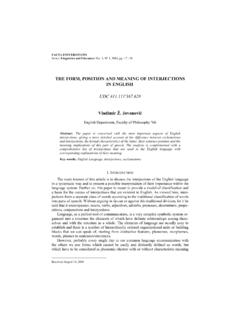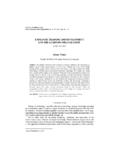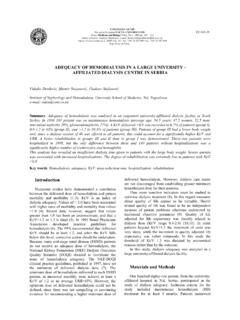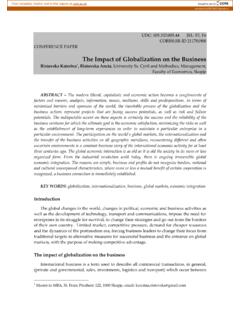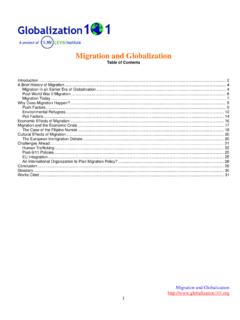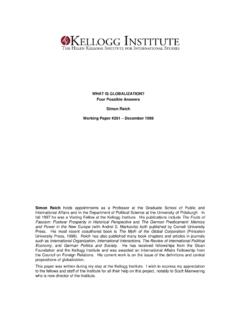Transcription of GLOBALIZATION: THEORETICAL PERSPECTIVES, IMPACTS …
1 FACTA UNIVERSITATIS Series: Economics and Organization Vol. 5, No 3, 2008, pp. 263 - 272 globalization : THEORETICAL PERSPECTIVES, IMPACTS AND INSTITUTIONAL RESPONSE OF THE ECONOMY UDC Zoran Stefanovi Faculty of Economics, University of Ni , Trg kralja Aleksandra Ujedinitelja 11, Serbia Abstract. globalization has major IMPACTS on contemporary economy. The paper sketches main directions of analysis of this complex phenomenon. It is suggested in the paper that, in spite of its powerful unification influence, the unified institutional framework of economy may not be the result of globalization .
2 Therefore, it seems that more moderate and less deterministic comprehensions of globalization are more helpful for understanding of both essence and effects of globalization . Key Words: globalization , economic theory, world economy, institutions. INTRODUCTION globalization certainly represents a mega phenomenon that is shaping today's trends. Its influence is the most visible in the economic sphere. We should therefore consider how globalization is perceived within the contemporary economic theory. There is no unique view of this process in economic theory.
3 Various schools of thought comprehend this proc-ess in accordance with their ideological positions. Then, crucial empirical trends of global-ization should be taken into consideration. This should lead to some conclusions about ap-propriateness of various schools of thought for analyzing this complex phenomenon. THEORETICAL DEBATE ON globalization The theory of globalization today is a field of intensive and multidisciplinary debate. Attendees are numerous, and often opposing views of the mentioned phenomena. The efforts towards defining globalization most often highlight its individual aspects.
4 Numer-ous definitions emphasize economic dimensions of globalization . Removing "artificial" barriers to flow of goods, services and factors of production on the world market (as the Received January 08, 2008 Z. STEFANOVI 264 consequence of modern development of transport and communication means) is seen as a crucial channel of international integration. Thus, globalization is defined as integration on the basis of the project, which expands the role of markets on a global level (McMichael, 2000).
5 There are also definitions that emphasize other relevant dimensions of globalization social, geographic, psychological. globalization is understood as a social process in which geographic obstacles to social and cultural arrangements lose importance and where people are becoming increasingly aware that they lose importance (Waters 1995, p. 3). Another definition of globalization , as intensification of world wide social relations which link distant localities in such a way that local happenings are shaped by events oc-curing many miles away and vice versa, is well known (Giddens, 1990, p.)
6 64). Globaliza-tion is also defined as compression of the world and intensification of consciousnes of the world as a whole (Robertson, 1992, p. 8). Even this small sample of definitions is sufficient to conclude that globalization is a complex phenomenon with multiple effects, which makes it hard to define. There are, in fact, three possibilities for defining globalization (Mittelman, 2006, p. 64). First, it can be defined as intensification of global flows of goods and production factors, facilitated by modern transportation and communication means.
7 globalization can also be defined as a compression of time and space in a way that events in one part of the world have instanta-neous effects on distant locations. The third approach is to comprehend globalization as a historical structure of material power. globalization represents historical transformation in the economy, politics and culture (Mittelman, 2006, p. 64). The driving force of globalization is certainly the progress of technology. It speeds up the effects of globalization , and contributes to essential transformation of the functioning of economic systems.
8 '' .. international economy is no longer divided vertically to sepa-rate national economies, but involves a number of different levels or types of market ac-tivities, which spread horizontally over a wider area of virtual space - replacing physical geography of national borders with quasi geography of market structures, transaction costs and informational cyber space.'' (Jak i , 1997, p. 13) The theory of globalization is a very propulsive area of research, but composed of contributions from many authors. Therefore, it is necessary to systematize sometimes quite heterogeneous understandings of globalization .
9 Quite spread out, but, for the pur-poses of further consideration, an entirely appropriate classification of globalization theo-ries differentiates three courses of analysis of this multidimensional phenomenon (Held, McGraw, 2007, p. 2): 1 hyperglobalists 2 transformationalists 3 skeptics. By hyperglobalists, globalization is viewed as a legitimate and irrepressible historical process, which leads to a world order based on the market and supranational institutions. globalization presents a new era in the development of civilization, without precedent in the course of human history.
10 This process is referred to as progressive and socially desir-able. It is also stressed that the intensity and dynamics of current changes in the economy lead to changes in core framework of social action (Held, McGraw, 2007, p. 5). Guided by the self-enforcing growth of global markets and technological progress, globalization inexorably destroys all previously established hierarchical structures. The globalization : THEORETICAL Perspectives, IMPACTS and Institutional Response of the Economy 265 role of the nation-state in this context is also significantly diminishing.



